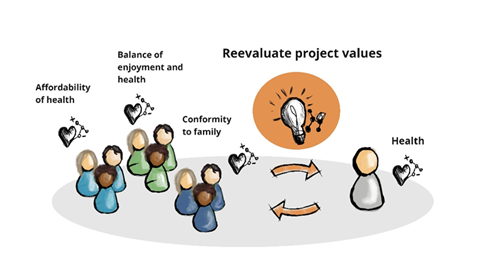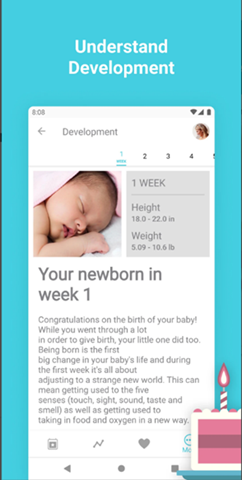Nadia sits on the couch for a moment after putting her baby in the crib for a nap. She takes her phone and opens the Baby+ app (Philips, 2020). The app shows her relevant articles aligned with her baby’s young age. An article about introducing solid food to your baby piqued her interest. She reads that her baby should be able to eat solid food by now. Her baby gagged two days ago when she tried to introduce some solid food making the baby unwilling to give another bite. Nadia starts to feel highly insecure, as a relaxed moment suddenly turns into a stressful one. This scenario illustrates how the app's evaluation of what the baby needs is in tension with Nadia’s own values of securing her baby’s well-being (e.g. based on her immediate perceptions of her baby’s responses to eating solid food).
Currently, many lifestyle improvement projects are being initiated in vulnerable neighbourhoods. Medical professionals have identified that people living in certain postal code areas are dealing with more health problems compared to other areas due to their socio-economic environment (Jongers, 2022). These initiatives can be problematic because of their ignorance of experiences of the project’s target group (which can be an instance of epistemological injustice). Projects can be set up from the value perspective of clinical health, defined as physical and mental health and operationalized by eating more fruits and vegetables, exercising, and not smoking. The target group may value health differently or hold a plurality of values that are not reflected in the project goal and designed outcome. But the values of what counts as healthy or healthy behaviours held by project initiators may be in tension with the target group, as in the example above of the Baby+ app.
In this blog post we argue that problems of epistemic injustice can easily occur in development projects – such as health interventions – due to the way such projects are structured. By ‘structured’ we refer to the procedural stages a project goes through, such as the problem identification, formulation of the design brief, the design process, and the evaluation of the intervention. However, issues of epistemic injustice in such projects often claim to be tackled by applying a 'Design for Values' approach such as Value Sensitive Design (VSD). We want to point out that such methods should be applied over the whole process and not just the design stage. The conceptualization of values that is being done in the stages before the design stage are often used to evaluate the project towards the end. This does not bring justice to the input of stakeholders that are not involved in these stages. Below we dissect this problem and argue for a less linear 'staged' project structure that promotes bottom-up value conceptions in the project evaluation.
Epistemic Justice and Value Sensitive Design
Designing interventions for vulnerable groups tends to be tricky. Like many development projects in the Global South, such interventions often belittle the end user and are weighted by a ‘we know better’ sentiment (Oloruntoba, 2020). This attitude is not only paternalistic, but also puts a value judgement on the type of knowledge that the end user possesses. Although the end user often does not rely on scientific knowledge, the end user holds on to other types of knowledge, such as practical knowledge and context-specific knowledge. Not only are these two types of knowledge types of value for a better design, accepting and valuing these types of knowledge also brings justice to the end user and empowers them in their position.
The field of study that this discussion belongs to is known as Epistemic Injustice. Philosopher Miranda Fricker defines epistemic injustice as a situation where “someone is wronged in their capacity as a knower” (Fricker, 2013, p. 1317). In development projects this form of injustice often occurs, for instance by assuming that a certain group lacks the knowledge capacity of how to live a healthy life. To address this injustice, awareness of project initiators and designers regarding their structurally powerful position is crucial to shift from designing for improvement towards designing for the user community. Democratising the design process by giving users a seat at the table, for instance by use of the Value Sensitive Design (VSD) approach, promises to provide an outcome here.
Nevertheless, using a VSD approach does not necessarily result in an epistemically just design. VSD builds on the notion that technologies are value laden and that values can be designed into technologies (van der Poel, 2021). By involving stakeholders and making it a participatory process, one could assume that this makes designs democratic. However, especially with development projects, the success of a project is measured by the initial value conceptualisation, like clinical health values. The knowledge of end users is not contemplated nor integrated in the result, making it a case of epistemic injustice. This problem arises because values behind project initiatives are often not part of the VSD process and thus their conceptions are not reevaluated.
Initial value conceptions and performance indicators
Now returning to the Baby+ app case, the problem is that when setting up a project like the design of a lifestyle app for the care of a baby, the project team sets a goal that holds certain values that are not re-evaluated. The project team wants to do good by increasing health and well-being and has their conception of how this value should be operationalized to norms and final design requirements. This way the project has succeeded when the norms are satisfied through the designed outcome, like getting parents to give their child healthy food because of the information provided in the app. However, the dimensions of value to parents such as enjoyment of their child and themselves regarding food may be neglected. If this value is considered, this should lead to a redefinition of norms and design requirements. In this case, a just lifestyle app would consider the enjoyment value dimension of food along with its health dimensions.
What should change?

Illustration by Noa van den Brink
As a solution to address this epistemic injustice, and to broaden the perspectives of the project initiators, many propositions have been made, from educating and raising awareness about potential epistemic injustices to addressing the lack of diversity among initiators. However, we do not wish to address how the gap between the communities and the project initiators could be bridged. Instead, we would like to address the current lack of methods aiming to reevaluate the value conception of the project (initiators) from a bottom-up perspective.
When designing for a community like vulnerable neighbourhoods, the members and their values undergo scrutiny, and in a way pass under the microscope. The values that led to the project being initiated in the first place do not undergo the same process, which we think has important consequences. By avoiding specification and conceptualization, the pre-set value(s) are less vulnerable to critique, remaining vague and concealed under the umbrella terms of Health or Human Welfare. VSD projects may often start with known values or values recognized to be of ethical importance in the conceptual phase, viewed as having inherent and independent moral epistemic standing. However, also when specified, values and their conceptualization in a project should still be open to change.
To conclude, we argue that the participatory component in health projects is heavily limited by the lack of reevaluation of project values in the light of a bottom-up perspective. Starting with pre-set values in the project and reflecting on how they are affected in the context (empirical investigation) is insufficient to enable a process of discovery and engagement with the plurality of values of the target group (Dantec et al., 2009). The pre-set values at the core of the initiated project are not open to change, and the conceptual framing remains based upon known values. This is a significant problem when designing for justice as the participatory process should both inform the values related to project goals and the evaluation criteria for the project success. Our critique therefore relates to the structural tension, both in terms of the design brief and in epistemic hierarchy at play.
References
Dantec, C. a. L., Poole, E. S., & Wyche, S. (2009). Values as lived experience. CHI ’09: Proceedings of the SIGCHI Conference on Human Factors in Computing Systems.
Fricker, M. (2013). Epistemic justice as a condition of political freedom?. Synthese, 190, 1317-1332.
Jongers, T.’. (2022, November 11). Armoede houdt je klein. Letterlijk. De Correspondent.
Oloruntoba, S. O. (2020). The politics of paternalism and implications of global governance on Africa: A critique of the sustainable development goals. Pan Africanism, regional integration and development in Africa, 165-179.
Philips. (2020). Baby+ (NL) - Philips. Philips Digital.
Van de Poel, I. (2021). "Values and Design." In Routledge Handbook to Philosophy of Engineering, edited by Diane P. Michelfelder and Neelke Doorn, 300-314.
About the author
Jean-Miguel Hamm
Jean-Miguel is a master student in Philosophy of Science, Technology and Society (MSc PSTS) at the University of Twente (Netherlands). He has bachelors in Philosophy and in History from Université Grenoble Alpes (France) and is currently interested in exploring the dynamics of co-shaping of technology and society, governmentality and the rationales and justifications supporting (social) design.
Noa van den Brink
Noa is a PhD candidate at the Faculty of Industrial Design Engineering (TU Delft) exploring how we can design smart digital technology to support the healthy lifestyle of young families living in neighbourhoods vulnerable towards unhealthy lifestyles. She is interested in how the values of families and stakeholders in the social and medical care system around them can play a role in the development of such technologies. Specifically, how participatory design methods and technology can empower families to understand their values and how they can be in tension regarding nutrition, stress and their social network. Secondly, how these value tensions could be transformed through personalized technology to support family well-being. Noa’s PhD research is part of the Our Smart Family Buddy project, initiated by Erasmus Medical Centre.
Jim van de Ven
Jim has a BSc Industrial Design and is currently a master student in Philosophy of Science, Technology & Society (MSc PSTS) at the University of Twente. His current interests include; the relationship between social practices and social meanings and the role of science and technology herein.




